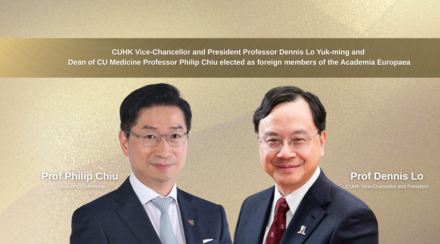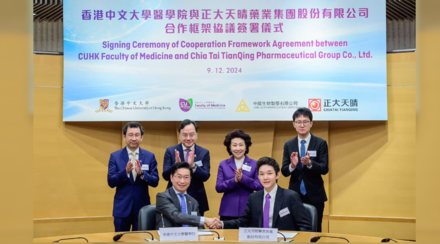CUHK Professor Dennis Lo receives the inaugural Tengchong Science Prize
Professor Dennis Lo Yuk-ming from The Chinese University of Hong Kong (CUHK)’s Faculty of Medicine (CU Medicine) received the inaugural Tengchong Science Award, the first science award launched entirely in mainland China and open to national and international nominations. Professor Lo was presented the prize at the opening ceremony of the 2023 Tengchong Scientists Forum on 1 December in Yunnan for his research achievements in liquid biopsy, contributing to significant scientific advances in medical research through non-invasive prenatal diagnosis and various cancer detection techniques.
“I am deeply honoured to receive the inaugural Tengchong Science Award. My research team and I will continue to push forward the biomedical science. We are also committed to nurturing the next generation of scientists, encouraging young people to pursue innovation in the field of science and contribute to the health of our nation and the global community,” Professor Lo said.
The inaugural Tengchong Science Award is the second national science and technology award in mainland China which offers a single prize of 10 million RMB, following the World Laureates Association Prize. It is a social initiative aiming at honouring scientists who have made significant breakthroughs at the forefront of science and technology and outstanding contributions to scientific discovery and technological innovation in the world. It adopts a nomination-invitation system and does not accept self-recommendations or applications. Nominators mainly include winners of major international awards, Chinese Academy of Sciences and Chinese Academy of Engineering academicians, foreign academicians, distinguished scholars from world renowned universities, research and academic institutions.
Expanding the field of non-invasive prenatal testing (NIPT) and pioneering non-invasive cancer detection
Professor Lo is globally renowned as a pioneer, innovator, and leader in liquid biopsy. In 1997, he reported the presence of cell-free fetal DNA in maternal plasma, laying the important foundation for non-invasive DNA-based prenatal testing. He further developed a non-invasive prenatal test (NIPT) for Down syndrome, which successfully translating NIPT from a scientific concept into a clinical diagnostic tool, and transforming prenatal care in modern obstetrics. Every year approximately 10 million pregnant women in over 100 countries benefit from NIPT which has a sensitivity of 100% and a specificity of 98%. Professor Lo is widely known as the “Father of NIPT” for his significant contributions to the field.

Professor Dennis Lo receives the inaugural Tengchong Science Prize.
Professor Lo has also systematically elucidated the biological mechanisms underlying cell-free DNA generation and clearance in peripheral blood. He has also used plasma Epstein-Barr Virus (EBV) DNA as a biomarker for nasopharyngeal carcinoma (NPC) to illustrate the relationship between screening, prognosis monitoring and response to treatment, which has great impact on the development of liquid biopsy in the next 20 years. In 2017, he published a prospective study involving more than 20,000 subjects, demonstrating the significant advancement in early detection of NPC patients using this technology, thereby improving their survival rates. This research article was selected as one of the ten most notable articles of that year by the New England Journal of Medicine.
Furthermore, Professor Lo has propelled cancer liquid biopsy into the era of whole-genome analysis through plasma DNA analysis in liver cancer patients. He was the first to demonstrate that tumour-derived DNA fragments are shorter than those derived from blood cells, and that plasma DNA terminal sequences can serve as biological markers for cancer detection. He also discovered that genome-wide methylation can be used for detecting various cancers and accurately identifying the tissue origin of tumours, thus establishing the clinical application of plasma tumour DNA. Recently, Professor Lo and his interdisciplinary research team have successfully developed technologies that allow for early detection of multiple types of cancer and have been working with commercial partners on clinical applications.
International accolades received for impactful research results on global health
In recognition of his work, Professor Lo has received numerous international honours and awards. He was elected a Fellow of the Royal Society in 2011 and a Foreign Associate of the US National Academy of Sciences in 2013. He received the 2014 King Faisal International Prize for Medicine and became the first Chinese scientist to be honoured with the American Association for Clinical Chemistry (AACC) Wallace H. Coulter Lectureship Award in 2015. In 2016, Professor Lo was selected as the winner of the inaugural Future Science Prize-Life Science Prize, which is regarded as China’s Nobel Prize. In the same year, he was named the Thomson Reuters Citation Laureate – Chemistry, an honour considered as a predictive index of the Nobel Prize. He was also the first Chinese recipient of the Fudan-Zhongzhi Science Award in 2019. In 2021, he received the Breakthrough Prize, widely known as the “Oscars of Science”, and became the first Chinese scientist to receive the Royal Medal in biological sciences from the Royal Society of London. In 2022, Professor Lo was awarded the Lasker-DeBakey Clinical Medical Research Award, widely regarded as the US’s top biomedical research prize. Last month he was elected as a member of the Chinese Academy of Sciences.






























